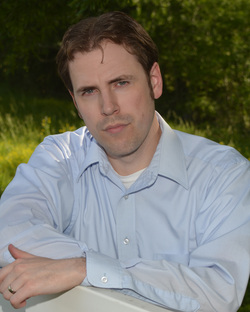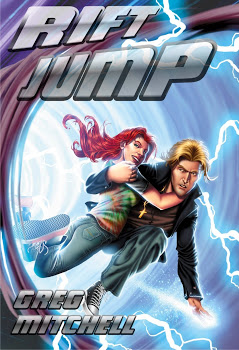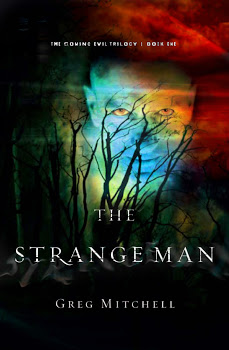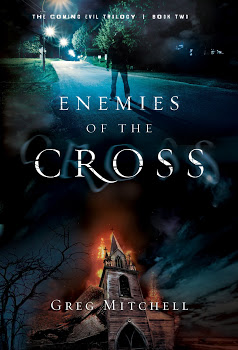
Here's how he describes himself: Greg Mitchell is a screenwriter and novelist and the author of "The Strange Man" and "Enemies of the Cross", the first two books in The Coming Evil Trilogy. Recently he saw the release of the multi-dimensional action romance novel "Rift Jump"--a story he began writing in high school. He lives with his wife and two daughters in Northeast Arkansas, plotting the inevitable day when the creatures of the night strike and all that useless monster movie knowledge he has can be put to good use.
Greg's blog, The Coming Evil, will introduce you to his books and short stories. Now, let's read my interview with him!

No, actually. I’ve always been more of a visual media person. When I was a kid, I really wanted to be a Disney animator or a comic book artist, but after I graduated high school, I wanted to be a filmmaker. I love visual storytelling. In fact, The Strange Man (Book One in The Coming Evil Trilogy) began life as an unproduced screenplay I hoped to film myself back in 1999. Well, obviously that didn’t pan out as I had no idea what I was doing, so I adapted and expanded the script into a novel. And, here we are. But, if you read my novels, they tend to be very cinematic and trimmed down narratives. It’s my goal with all of my books to make a movie for your mind.
With The Coming Evil series, you seem to have a Lovecraft-ian kind of horror going on. With Rift Jump, it’s more “wibbly-wobbly, timey-wimey Dr Who” – ish. Do people ever look at you as if you were crazy when you try to explain writing sci fi/fantasy with a Christian worldview?
Not so much anymore. I think there was a little trepidation from folks when I first started back in the late ‘90s, but there’s a whole subculture of writers and fans who enjoy mixing their faith with the fantastic. It really surprised me, too, as I thought I was alone for the longest time, but about 2006 or ’07 I met the Lost Genre Guild and realized that there’s a lot more of us than I thought. You wouldn’t know that stepping into the Christian Fiction section of your local bookstore, as the mainstream Christian market has a very particular niche—mostly bonnet romance novels.
Obviously, writing horror has been a hot-button issue, and still is, every once in awhile. There are those who hold to the idea that all horror is just celebrating the devil or opening pathways to the occult and that it’s all a bunch of blood and guts and has no redeeming value whatsoever. Whenever the conversation heads that way, I always do my best to explain the value I see in it, as it’s the only genre that allows for even an atheist to concede that there is a God, if only for the duration of the story. Horror is the perfect place to discuss good and evil, man’s fallen nature, the holiness of God, and the corruption of sin. It’s all in how you use it. “Horror” is a very broad term. I believe that monsters are perfect symbols of deep, real things that we collectively fear, and horror is the only place where people can safely face those fears and discuss them and work through them. We need horror, as a genre. But I don’t like the blood and guts stuff, just for the sake of exploitation. I demand more out of my monster movies like sympathetic characters, interesting themes, and visible passion on the part of the filmmaker. I fear that there’s a lot of garbage in the horror genre, just because it seems to be a genre that Hollywood studios easily misunderstand. They think “Oh, let’s just throw in some blood and guts and people will like it”. Some might, yeah, but you’re never going to really hit that sweet spot that makes a horror movie not only good, but timeless and relevant. You’ve got to be deeper than just “sex and violence”.

I always have to fill them in as I go, otherwise I would get totally bored. I love being surprised when writing as I imagine that I’m my first audience. If I’m not surprised and excited and intrigued, then I can’t expect anyone else to be. Hopefully they are! With the rare exception of a short story or two, most of my works fit together into a single mythology. Not always directly, but there are connective threads between Rift Jump and The Coming Evil Trilogy and other works I have coming down the road. Sometimes I set out to make those connections, but many times they surprise me. A character in Story A says something that sparks an idea that I can carry out in Story B, which feeds back into an idea over in Story C. That’s where the surprises come in, and it’s really neat to sit back and see how everything ties together.
Pantser or plotter? Why?
A little bit of both. I need to know my ending. I need to know where I’m headed, emotionally, and I need to really be sold on the payoff. But everything leading up to that moment is come-what-may. It’s part of the excitement!
I see you happen to live in Arkansas, which is about as far away from Connecticut as I can imagine (we’re very xenophobic in the northeast). My publisher is also in Arkansas. What’s the coolest thing about your hometown?
Paragould (where I live) is, probably what I would call, a rural town. There’s a small patch of town, surrounded by pastures and woods. You still have to slow down for John Deere tractors driving 5 miles per hour on the roads—the highways, no lie. It’s a very slowed down pace of life, and I find that to be comforting, since the writing industry (at least, as I’ve experienced it) is so fast-moving and “now, now, now” with deadlines and promotion and contracts and headaches. After dealing with that, as well as a regular 8-5 job that pays the bills, I love taking the long way home, going down country roads and enjoying the peaceful scenery.
I happen to find naming my characters very easy – the names just pop into my head, and once a character has a name, I can’t change it. Do you work on names? Michael, for example, is a Biblical avenging angel who is responsible for sending Satan to hell. Are you consciously using associations when you name your characters?
I honestly don’t know where I get my names most of the time. Yes, you’re right about Michael and the archangel—a fitting description given what the character of Michael in Rift Jump is capable of doing, but I don’t necessarily know if that was intentional. I have a very active subconscious thought life and it is easily influenced, ha ha. I pull from things all the time without even being aware of it until much later :p

There was a huge difference between working with Splashdown (small press for Rift Jump) and Realms (large publisher of the first two Coming Evil books). At Realms, you turn in your manuscript, then you kick back, watch TV, and in a few months they send you a cover, they send you the book typeset, and all you gotta do is approve or make minor suggestions/corrections. I mean, you work with an editor before that, but it’s all very “hands off”. At Splashdown, though, you are involved in every phase of production. You can be as hands-on as you want to be, even formatting your own book and selecting your own fonts. Heck, you could design your own cover if you wanted. In the case of Rift Jump, I had a specific artist whom I wanted to handle the cover duties, so I contacted him and got that rolling. Personally, I did like kicking back and letting the publisher do all the work, because I’m lazy, but for some projects, I like the more active creative control that a smaller press like Splashdown offers. But every publisher is different. I’m sure there are plenty of small presses that want to handle production and don’t want you involved except to sign off on it.
But, really, that’s where the differences between the two worlds stop. Despite what many people might believe, writers published by a big press or a small press must face the same insurmountable obstacle—promotion. Unless you’re Stephen King or James Patterson or whoever, a bigger publisher is NOT going to promote you. They still expect you to do all the work, getting your name out there. In fact, every submission form I’ve filled out for a publisher asks “What can YOU do to promote your book?” They expect you to be social media savvy and build your own blogging presence and sell, sell, sell. Sure, they’ll put your books on the shelves in physical stores—which is something a small press can’t do—but they won’t tell anyone that you’re there. That’s still up to you. So, it makes for a lot of very discouraging work as you’re trying to shout louder than everyone else and get your product out there in front of the people. It’s my least favorite aspect of the business. I think that’s probably true for most writers. If we liked being social and talking to people, we wouldn’t choose a profession that requires us to be locked up in solitary caves months out of the year writing :p
I do think that small presses ensure that every Reader can find something. No matter what genre you like or what combination of genres, there’s something out there for you. Again, the hardest thing to do is connect the Writer to the Reader.
I have two daughters, too. I found them “sword fighting” with paper towel tubes and casting curses on each other the other day. Do you think what you’re writing rubs off on your family? Is it hard to explain what you do at PTA meetings, for example?
Ha, yeah, I absolutely think my writing rubs off on my girls. Right now, my girls are aged 6 & 2, but they can tell you how to kill a vampire. They know the names of the classic monsters and can spot a number of more obscure Star Wars aliens in a lineup. My oldest daughter, Jo, is still very much a girlie girl. She loves pink and princesses, but she also knows that a full moon means possible werewolf trouble. It’s funny, Jo just started first grade. She came home one day during the first week of school and said she had to get a mirror to take the next day. When asked why, she said that some girl on the playground claimed to be a vampire, so Jo was going to see if she had a reflection to test her. I was very proud. Then we discussed other ways to detect a vampire—like throwing sunflower seeds on the ground (in traditional lore, vampires have major OCD and would have to stop and count all the seeds), or tying knots (again, they have to untie knots, compulsively). All a very serious discussion, that I imagine most families don’t have. Of course, we concluded that if the girl was playing on the playground during the day, that was probably good evidence she wasn’t really a creature of the night ;)
Buy them! :p If fun, scary thrill rides are your thing, the first two books of The Coming Evil Trilogy--The Strange Man and Enemies of the Cross—are available in stores everywhere. The plan is to release the third and final book next year and it’s building to be a pretty epic finale with lots of tentacles and explosions and fright. I’ve been working on this series for over a decade, so it’s my baby and I can’t wait to see it reach completion. If you’re not into monsters so much, I hope you give Rift Jump a shot. Like you mentioned, it’s sort of Doctor Who, but with more teen angst romance and super-hero action. It’s fun, fast-paced, and apparently perfect for YA readers. I hadn’t intended on writing a YA novel (except for the fact that Michael and Sara, the main characters of Rift Jump, are teenagers), but it’s found me! Rift Jump has parallel dimensions and spaceships and sea monsters and it’s just a lot of fun. I hope everybody stops by the site to check it all out!
Thanks for having me, Jennifer. I had a great time :)

 RSS Feed
RSS Feed